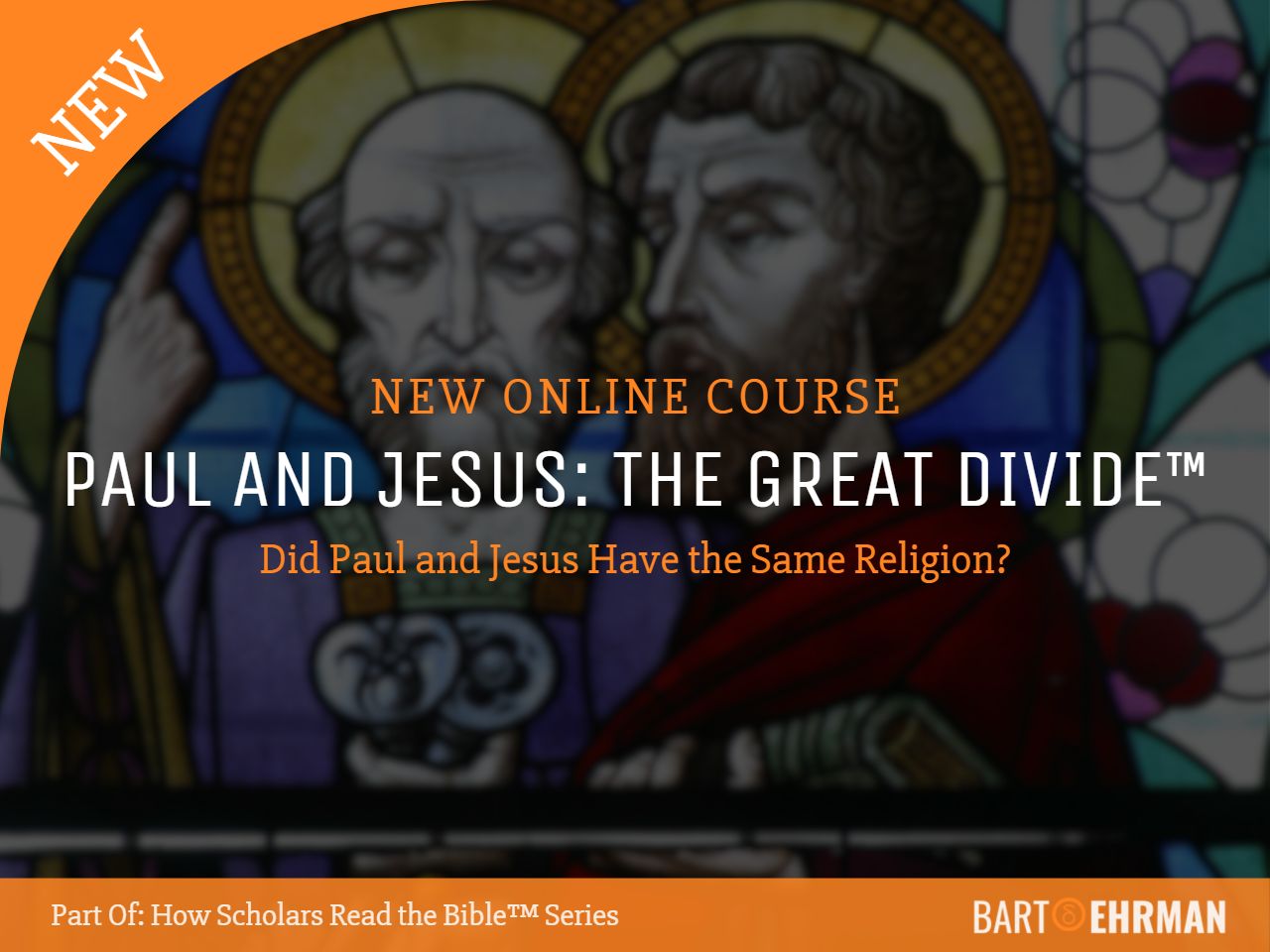Founder of Christianity: Who Founded the Christian Religion?

Written by Marko Marina, Ph.D.
Author | Historian
Author | Historian | BE Contributor
Verified! See our guidelines
Verified! See our editorial guidelines
Date written: March 8th, 2024
Edited by Laura Robinson, Ph.D.
Disclaimer: The views and opinions expressed in this article belong to the author and do not necessarily match my own. - Dr. Bart D. Ehrman
From towering cathedrals to intimate prayer gatherings, Christianity's influence permeates nearly every corner of the globe. Its enduring presence begs a fundamental question: Who is the founder of Christianity? For centuries, this question has sparked lively debate among theologians, historians, and everyday people alike.
With its rich historical tapestry woven over millennia, Christianity presents a unique challenge to historians and scholars attempting to pinpoint its origins. Unlike other religions whose foundations are often attributed to a single figure, Christianity's emergence is a tapestry of theological developments, historical contexts, and transformative figures.
In this exploration, we approach the topic from a scholarly and neutral perspective, seeking to illuminate the multifaceted debate surrounding the founder of Christianity. Our journey doesn’t seek to provide definitive answers but rather to engage with the complexity of Christianity's genesis.
We’ll examine various theories, from those that attribute the religion's foundation to the Apostle Paul, known for his epistolary contributions and missionary journeys, to the central figure of Jesus, whose life and teachings are at the heart of Christian doctrine.
Furthermore, we delve into the collective impact of early disciples and the pivotal belief in resurrection as catalysts for the faith's emergence.
This article aims to navigate these discussions with clarity and simplicity, making the rich academic discourse accessible to a lay audience. By dissecting various perspectives and theories, we hope to draw closer to understanding the nuanced and collective origins of Christianity—a task that challenges the notion of attributing its foundation to a single individual.

Is Jesus the Founder of Christianity?
When discussing the origins of Christianity, the figure of Jesus of Nazareth is inevitably at the forefront of the conversation. To the casual observer or common believer, it might seem straightforward to attribute the foundation of Christianity to Jesus himself, akin to how Muhammad is regarded as the sole founder of Islam.
This comparison, however, reveals the complexity inherent in understanding Christianity's beginnings.
Islam, as a new religious movement, was founded by Muhammad, making the question of its origin relatively straightforward. In contrast, Christianity's connection to Jesus is complex; it’s not the religion he followed but instead a faith that evolved primarily based on the belief in his resurrection.
Jesus was unmistakably a Jew, born into a Jewish family, living in a region governed by Jewish customs and laws. In other words, the historical Jesus' identity is deeply rooted in Jewish tradition, something that is universally acknowledged by scholars.
His life, as recorded in the canonical gospels and corroborated by historical research, was steeped in Jewish practices, beliefs, and hopes. His public ministry, which lasted approximately three years, was characterized by teachings, parables, and actions that were profoundly Jewish.
This is crucial in understanding the distinction between Jesus and the religion that bears his name. Jesus preached within the context of first-century Judaism, adhering to its laws and seeking the fulfillment of its prophecies.
Renowned Historical Jesus scholars such as Paula Fridriksen and Dale C. Allison Jr. have emphasized Jesus' role as an apocalyptic prophet. Their research presents a Jesus who was deeply enmeshed in the Jewish apocalyptic tradition, proclaiming the imminent arrival of God's kingdom.
This apocalyptic message, with its roots in Jewish thought and eschatological expectations, was a call to repentance and transformation in anticipation of God's impending intervention in history. Jesus' message and actions weren’t, therefore, about founding a new religion but about urging a renewal within Judaism, based on his interpretations of Jewish law and tradition.
The transition from Jesus' Jewish ministry to the foundation of Christianity as a distinct religion involves a complex evolution of his followers' beliefs and teachings after his death. While Jesus' life and message were the catalysts for Christianity's formation, the religion as it’s known today was shaped by the belief in his resurrection and subsequent interpretation of his life and death.
This transformation led to the creation of a new religious movement that, while rooted in Jewish expectations and Jesus' apocalyptic message, evolved beyond the boundaries of Judaism as practiced by Jesus.
Yet, despite these insights into Christianity's Jewish roots and the transformative figure of Jesus, some contend that the religion's true founder can indeed be pinpointed. For this group, Christianity's inception rests squarely on the shoulders of a singular, profoundly influential figure responsible for its foundational development.
Who Founded Christianity? Was it Apostle Paul?
Apostle Paul stands as one of the most influential figures in early Christian history. Before his dramatic conversion on the road to Damascus, Paul was known as Saul, a fervent persecutor of Christians. Following his conversion, he became a dedicated missionary, spreading the teachings of Jesus Christ across the Roman Empire.
A consensus among critical scholars suggests that Paul authored seven of the thirteen epistles attributed to him in the New Testament. These texts are foundational to Christian theology, offering insights into the beliefs, practices, and organizational aspects of early Christian communities.
Scholarly Insights
The Damascus Road Dilemma. Scholars remain deeply divided over how to classify the transformative event Paul experienced on the road to Damascus. Was it a conversion, suggesting a switch from one religion to another? Or, was it better understood as a Call (Greek: καλέω), a divine summons that did not entail abandoning one faith for another?
This debate is more than semantic. Labeling it a conversion implies Paul left Judaism for a distinct Christian faith—a problematic notion given that, in Paul's era, Christianity had not yet emerged as a separate religious entity. Yet, there's no denying that whatever happened on that road profoundly altered Paul's understanding of God's actions and Jesus's identity.
In the scholarly discourse on the origins of Christianity, the figure of Paul looms large, with some positing him as the de facto founder of Christianity.
This view is articulated compellingly in Gerd Lüdemann's book, "Paul: The Founder of Christianity." Lüdemann argues that Paul's interpretation of Jesus' teachings and his theological contributions significantly shaped the early Christian movement, setting it apart from its Judaic roots.
According to this perspective, Paul's visionary approach to Jesus' death and resurrection, along with his emphasis on salvation through faith, laid the groundwork for Christian doctrine and practice.
In other words, his thesis places Paul at the center of Christianity's development, highlighting his role in expanding the religion beyond its initial Jewish audience to a broader Gentile (non-Jewish) one.
This expansion was not merely geographical but also theological, as Paul's writings addressed complex issues of law, grace, and redemption in ways that made the nascent religion accessible and appealing to a diverse range of people across the Roman Empire. So, was Paul the founder of Christianity? Let’s take a closer look at Lüdemann's key thesis.
Paul: The Founder of Christianity? Assessing the Claim
The claim that Paul can be called Christianity’s founder warrants a nuanced examination, particularly when considering his initial stance towards the early Christian movement. Paul's writings offer a candid glimpse into his life before his transformative encounter on the road to Damascus.
He openly acknowledges his role as a persecutor of Christians, driven by a fervent allegiance to "the traditions of my fathers" (Galatians 1:14). This zeal, as noted by Dr. Bart D. Ehrman, underscores a profound commitment to Jewish traditions and a vehement opposition to any teachings that deviated from established beliefs.
This opposition, as Arland J. Hultgren notes, was notably sparked by the proclamation from Jesus' followers that he had risen from the dead and was the awaited Messiah. Such claims were antithetical to the prevailing Jewish expectations of the Messiah's nature and role.
As elucidated by John J. Collins, an authority on Jewish messianic beliefs during the first century, there existed diverse messianic expectations among Jews—ranging from a heavenly redeemer to a mighty king, or a powerful priest. However, none of these anticipations could reconcile with the notion of a Messiah who had suffered a humiliating death on the cross.
This concept wasn’t only novel but also deeply offensive to the traditional Jewish understanding of messianic deliverance. Paul's initial persecution of Christians, therefore, stemmed from a profound theological and ideological clash with the core Christian claim of Jesus' crucifixion and resurrection.
Furthermore, scholars would argue that Jesus and Paul diverged on some key religious issues. To find out more about it, we invite you to check out the online course "Paul and Jesus: The Great Divide," led by the esteemed scholar of early Christian history, Bart D. Ehrman. This thought-provoking course examines the complex relationship between Paul and Jesus, challenging conventional wisdom and exploring the intricate dynamics of their teachings.
Given this context, positioning Paul as the sole founder of Christianity appears problematic. His early actions against the followers of Jesus highlight a significant transformation from persecutor to proponent—a journey that reflects a complex engagement with, rather than the initiation of, the Christian faith.
This shift in Paul's life underscores the multifaceted origins of Christianity, suggesting that its foundation lies in a collective experience and proclamation rather than in the vision of a single individual.
What Founded Christianity? A Crucial Belief
My students are often taken aback when they learn that Jesus was not the only Jewish self-proclaimed prophet in 1st-century Palestine. Indeed, figures like the obscure Egyptian prophet referenced by Flavius Josephus also made bold claims and attracted followings, only to meet similar fates at the hands of Rome's formidable military might.
Yet, a critical divergence sets Jesus apart from these contemporaries: whereas the movements led by other prophets disintegrated under Roman suppression, the movement initiated by Jesus did not. The linchpin for this resilience? The belief in the resurrection.
Contrary to the assertions of previous generations of scholars, such as Wilhelm Bousset, who posited a gradual emergence of resurrection belief, contemporary scholars suggest that this conviction took root among Jesus’s earliest followers remarkably swiftly after his death.
This nascent belief wasn’t merely an adjunct to the myriad Jewish messianic expectations of the time but was a radical departure that imbued Jesus's followers with an unprecedented sense of purpose and identity. It’s the belief in Jesus's resurrection that arguably set Christianity on a trajectory distinct from Judaism, laying the foundational stones for a new, distinct religion.
Christianity, with its rich tapestry of beliefs, rituals, and theological nuances, cannot be reduced to a single origin point. However, if tasked with identifying the most pivotal moment that contributed to its genesis, the belief in Jesus' resurrection stands out as a compelling candidate.
That, of course, begs the question of who was the first among Jesus' disciples to believe in his resurrection. This inquiry leads us directly to figures such as Peter and Mary, whose early encounters with the resurrected Jesus, as recounted in the New Testament, highlight their foundational roles in the nascent Christian movement.

Peter and Mary as the Founders of Christianity?
In the quest to understand Christianity’s origins, it becomes increasingly clear that the focus shouldn’t be placed on a single founder of Christianity, but rather on a group of individuals who collectively came to believe that God had raised Jesus from the dead. This belief, emerging among Jesus' earliest followers, marked a pivotal moment in religious history, setting the stage for the birth of a new faith.
Paul's account in 1 Corinthians 15:5-8 offers an invaluable insight into the early Christian belief in the resurrection. According to Paul, Jesus first appeared to Peter and then to the Twelve, suggesting that Peter might have been among the first to experience a profound religious vision that he interpreted as an encounter with the risen Jesus.
Some scholars have speculated that Peter's guilt over his denial of Jesus could have triggered a psychological phenomenon, leading to a vision that Peter understood as a real appearance of Jesus resurrected.
Daniel Defoe observed long ago: “Conscience makes ghosts walk, and departed Souls appear, when the Souls themselves know nothing of it.” It’s a theory most often related to Gerd Lüdemann, but it goes back to Selby V. McCasland’s study at the beginning of the last century.
However, the Gospel narratives present a different version of the events following Jesus' resurrection. According to the four canonical Gospels, it was the women who followed and supported Jesus—Mary Magdalene being prominently mentioned—who first encountered the empty tomb and the news of Jesus' resurrection.
These accounts vary in details, such as the number of women present and their identities, highlighting the discrepancies within the Gospel stories themselves. Such variations are discussed extensively in Bart Ehrman's "Jesus Interrupted," illustrating serious challenges in harmonizing these accounts.
These differing narratives underscore the difficulty in pinpointing who exactly were the first witnesses of the risen Jesus and, by extension, who founded Christianity. The emergence of the belief in Jesus' resurrection among his followers was undoubtedly a turning point, catalyzing the transformation of a Jewish messianic movement into a distinct religious tradition.
Yet, it’s crucial to acknowledge that Christianity didn’t immediately separate from Judaism; rather, it remained within the Jewish religious matrix for decades, with the parting of ways between the two religions unfolding gradually until the first half of the 2nd century.
Summing up Conclusion
Christianity, emerging from the crucible of 1st-century Palestine, wasn’t the product of a single individual but rather the collective result of early followers who became convinced of a momentous event: that God had raised Jesus from the dead.
This belief served as the fulcrum upon which the nascent faith pivoted, transforming a Jewish messianic movement into a religion that would transcend its Judaic origins and spread across the globe.
The early Christian community, characterized by diversity in thought and experience, coalesced around the transformative idea of the resurrection. This, coupled with the evangelistic zeal of Paul and the enduring support of Jesus' earliest followers, facilitated the religion's expansion beyond its Jewish enclave into the broader Roman world.
Hence, when posed with the question, "Who founded Christianity?" we find that Christianity's origins are best understood as a collective phenomenon rather than attributable to a lone architect.
The emergence of Christianity as a distinct faith underscores a complex interplay of historical events, individual experiences, and shared beliefs, marking a decisive turning point in the religious landscape of the ancient world.


